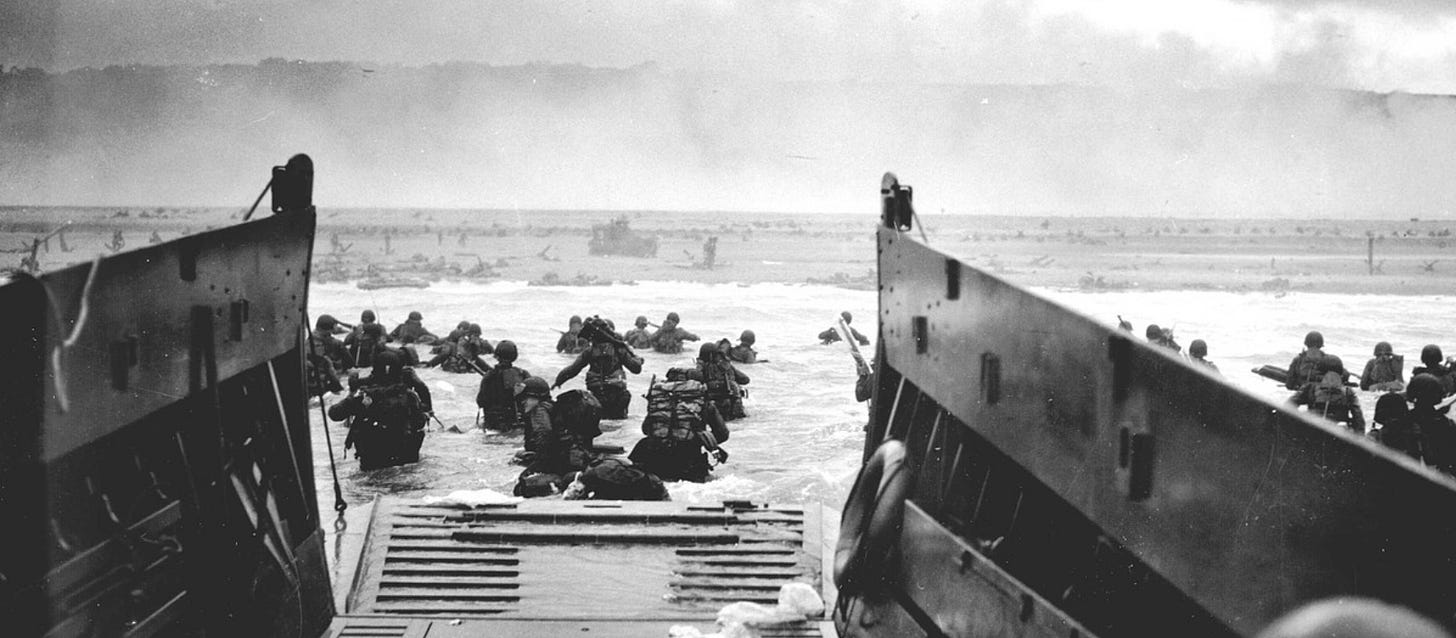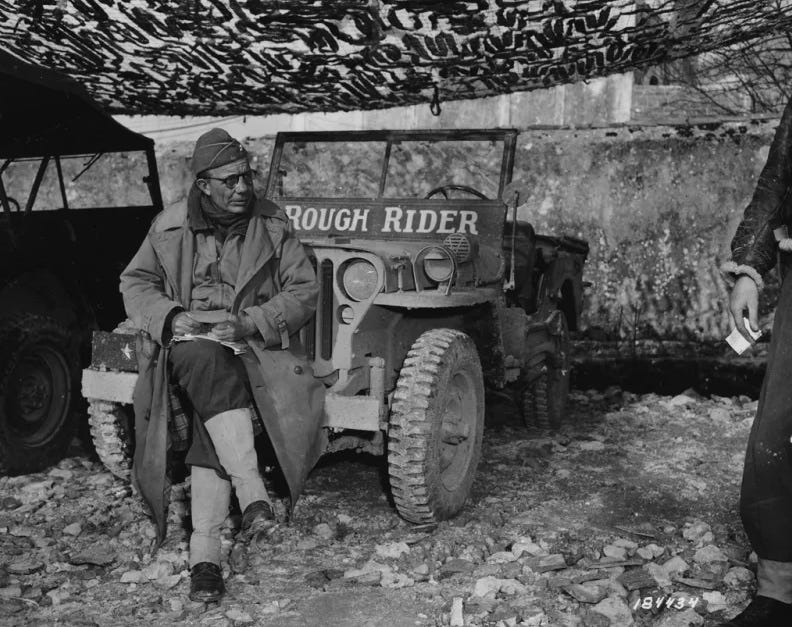Start from here
An inspiring D-Day story, for an extra reason. Also, 7 other things worth knowing today.
Seventy-eight years ago this morning, a middle-aged man who had a heart condition and who walked with a cane led the first wave of Allied troops landing at Utah Beach in France.
His name: Theodore Roosevelt Jr., son of the former president.
His professional pedigree: ex-chairman of American Express, former vice-president at Doubleday Books, and one-time governor of both Puerto Rico and the Philippines (both of which were U.S. territories at the time).
Entire books have been written about Roosevelt, culminating with his experience on D-Day and the month that followed. He'd fought in World War I, held onto his reserve commission in the 1920s and 1930s, and asked to go back on active duty when World War II broke out.
By the invasion of Normandy, he was a one-star general, but physically he had aged faster than his years. His requests to land with the first elements were denied several times before finally being granted.
At 56, he was the oldest and highest-ranking soldier who actually set foot on the beaches of Normandy under fire so early.
A lot of things did not go to plan during the invasion of Europe. Paratroopers were scattered all over Normandy. Omaha Beach especially was heavier fortified than anticipated.
In Roosevelt’s case, his landing craft drifted a mile away from where it was supposed to. Troops were landing haphazardly, with little idea how they would even approach the objectives they were supposed to seize, at least on paper.
In the chaos, by all accounts Roosevelt was preternaturally calm, encouraging the (much) younger troops. A sergeant recalled him strutting calmly and confidently, “with a cane in one hand, a map in the other, walking around as if he was looking over some real estate.”
At one point, Roosevelt said something that became legendary. Basically, instead of trying to resurrect the original invasion plan, he made the decision that the Allied forces should fight from wherever they found themselves.
The famous line: “We'll start the war from right here!”
Thankfully, the Allied invasion of Europe succeeded, and the Nazis were defeated. (Otherwise, this newsletter might possibly have been written in German.)
And while there are millions of brave stories from D-Day, I wanted to share this one from Roosevelt's experience, because I think it’s especially relevant today—in a much more personal way.
We all have plans. We all have ways we’d like to see our lives work out. Sometimes they do, but very often—well, very often our landing crafts hit the beach a mile away from where we think they’re supposed to (so to speak).
Relationships fail. Opportunities pass us by. We make bad decisions. Luck just goes badly. Well-thought out plans fall apart. It’s easy to get caught up in what might of been. I’m probably as susceptible to this kind of retrospection as anyone.
But, if you follow Roosevelt’s advice—basically, don’t worry about what might have been, or what mistakes or misfortune might have gotten you to your starting point—but instead, start your war from wherever you are, you wind up with a much greater chance of success, or happiness, or whatever your goal actually is.
There’s a sad coda to Roosevelt’s story in that his bad heart was literally the death of him; on July 12, still in France, he suffered a heart attack and died. He was posthumously awarded the Medal of Honor, one of four soldiers to receive the nation’s highest award after D-Day.
Honestly, that just makes it all the more poignant. Fight from where you are. If you don’t know how much time you have left, don’t spend any of it worrying about what might have been.
Thanks to everyone for our spirited but ultimately civil debate about student loans last Friday. I’m proud of us for tackling contentious topics but usually handling them this way.
Also: This is weird, but a couple of readers have used the 5-star feedback form (without including a reply-to address) to say they’ve missed seeing the 7 other things part of the newsletter.
But I haven’t stopped it; it’s been in every single newsletter going back 2 years. Is anyone out there not able to see it? Is it getting cut off somehow? Please let me know. Thanks!
7 other things worth knowing today
The world’s attention seems to have moved on from Ukraine. Here’s a first-hand report from The Washington Post’s Siobhán O'Grady, taking cover from artillery fire with Ukrainian troops. (WashPost, 🎁 link)
The process of buying a home is so traumatic that it's making half of Americans cry, a survey finds. The report also found that 65% of Gen Z buyers and 61% of Millennials reported crying while trying to buy a home. (Business Insider)
Italian and Catholic media are rife with unsourced speculation that Pope Francis, 85, might be planning to follow in his predecessor Pope Benedict’s footsteps by retiring, given his increased mobility problems that have forced him to use a wheelchair for the last month. (AP)
Fascinating interview with two academics who have studied every mass shooting in the USA since 1966: “[T]hese are suicides, in addition to homicides. Mass shooters design these to be their final acts. When you realize this, it completely flips the idea that someone with a gun on the scene is going to deter this. If anything, that’s an incentive for these individuals.” (Politico)
Ann Turner Cook, who was immortalized in charcoal as the original Gerber Baby, passed away at the age of 95. The baby brand announced Cook’s passing on Instagram on Friday. (Scary Mommy)
An 83-year-old Japanese adventurer, Kenichi Horie, just became the oldest person in history to complete a solo, nonstop sailing voyage across the Pacific Ocean. Horie returned home to Japan Saturday, after a 69-day voyage in a 19-foot boat from San Francisco. (Star-Advertiser)
Original Siskel & Ebert review of Saving Private Ryan, 24 years ago:
Thanks for reading. Photos: Library of Congress, but via Pixabay. Want to see all my mistakes? Click here.




Thanks for another good email.
I have a few other subscriptions to daily emails that either summarize the news or share worth-knowing information (or a combination of both), yours is the only one I read.
I didn’t know this about Gen. Theodore Roosevelt. Thank you for this reminder of today being June 6, D-Day. Will put our flags out front to commemorate it.
As an aside, I took the time to read all of the links of today’s other 7 topics.
I appreciate them all … !!
One wonders if people who cry during the process of trying to buy a house - whether they might feel entitled to get what they want, when they want, and how they want it (?) Then again, they say it’s healthy to release pent up emotions…
I enjoyed reading about the 83 yr. old gentleman who sailed across the Pacific… it gives me both encouragement and incentive to maintain my mental and physical health!!